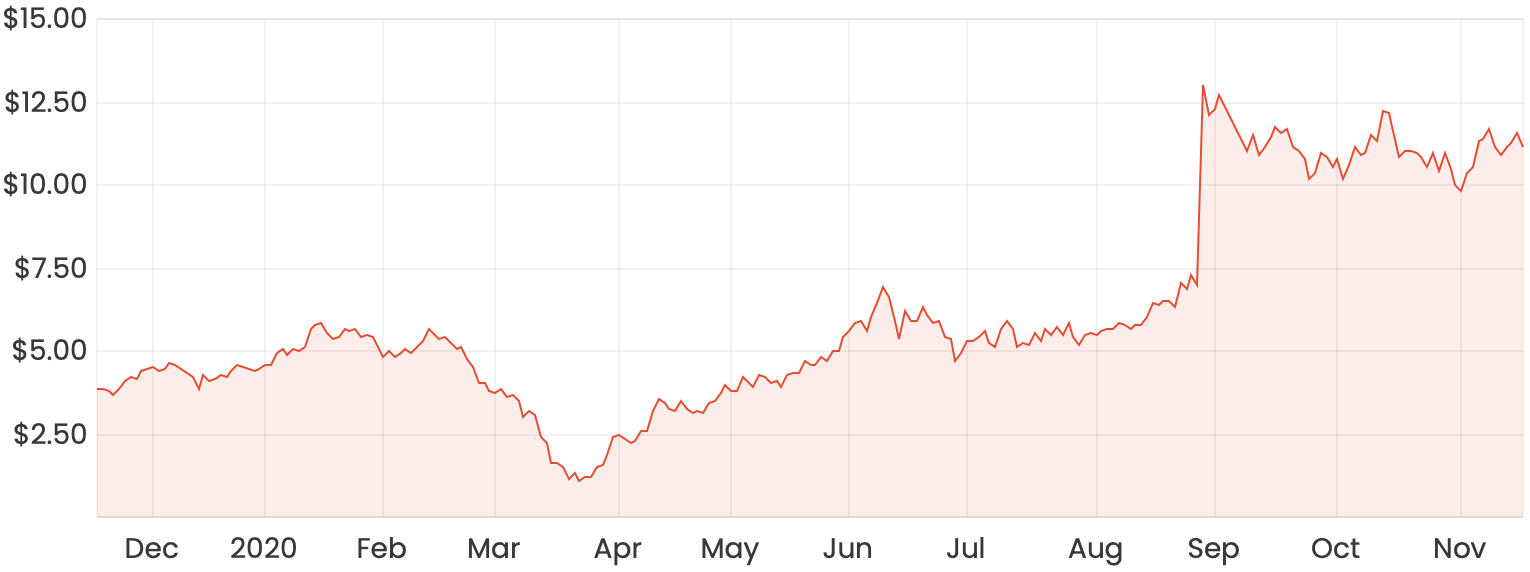The Pointsbet Holdings Ltd (ASX: PBH) share price has languished around the $11 mark for the last few months now. The company’s partnership with NBC Sports saw the share price more than double overnight in August, but is now slightly more stable.
PBH share price chart

This article will not focus on PointsBet’s operations or anything of that matter. Rather, it will purely focus on the valuation aspect.
Why? Because I think any time you see these huge 100%+ jumps in the share price overnight, quite often, much of that increase could be attributed to positive sentiment rather than fundamental factors that justify these price movements.
Given the recent spike in PointsBet’s valuation, this article will dig a little bit deeper and explain my reasoning as to why I think the way I do.
PointsBet’s valuation
I like the direction PointsBet is heading with its expansion into new markets, but I still think it’s important to get a rough idea of the valuation that comes with it.
Like most companies that are in a growth phase, PointsBet is currently unprofitable. This makes valuation methods such as a discounted cash flow (DCF) model difficult, as the business has no predictable free cash flows that can be discounted back to today.
How I’d value PointsBet shares
Instead, an alternative is to compare PointsBet to another betting company. I’ve decided to compare PointsBet to UK bookmaker William Hill plc (LON: WMH).
For those unfamiliar with this type of valuation method, comparative multiples, what we’re essentially doing is looking at a competitor’s valuation (i.e. market capitalisation) and the amount of money it generates. We can then use these figures as a benchmark to apply to Pointsbet to work out its own implied earnings it would have to make to justify its current valuation.
We know that William Hill currently has a market capitalisation of £2.8 billion, with full-year revenue of £1.3 billion and net income of £150 million. This gives William Hill a price/sales (P/S) and price/earnings (P/E) ratio of 2.11 and 18, respectively.
We also know that PointsBet has a market capitalisation of $2.4 billion at the time of writing. If we use the same P/E and P/S ratios from William Hill, we can work out the implied sales and earnings PointsBet will need to have in order to justify the current market capitalisation. In this case, assuming the multiples are fair, PointsBet would need to have revenue of $1.1 billion and net earnings of $133 million (right now) for the current valuation to make sense, relative to William Hill.
To put those figures into perspective, PointsBet reported just $75 million in revenue in FY20, a fair way off the $1.1 billion mark.
Is PointsBet’s valuation justified?
PointsBet’s valuation may seem extremely stretched to some, but it is important to remember just how big the US sports betting market really is. Firms like JPMorgan estimate that sports betting revenues could reach US$12.3 billion by 2025.
PointsBet has indicated it plans to have around 10% of the total market share, which means generating around US$800 million to US$1 billion in revenue from its US segment alone by 2025. Given that PointsBet also has its Australian segment to contribute to revenue, it seems plausible that it could reach those revenues I mentioned earlier to justify the current share price.
My thoughts on PointsBet shares
I’m still not liking PointsBet as an investment at today’s prices, and here’s why.
In my view, the current PointsBet share price is pretty much fairly priced IF the company can actually reach this massive growth target in the US. To me, taking a punt and banking on huge growth to end up with a share that’s fairly valued at best is less than ideal in my eyes. I’d rather find a share that’s fairly valued where the market thinks it has modest growth expectations – this way there’s less downside risk while still having upside potential.
One more thing I’d add is that this valuation could possibly make sense, but in 2025 when these revenue targets are hypothetically reached. I’m going to assume that today’s share price of $11.29 is fair based on the assumption that it does in fact reach the US revenue targets. This amount really needs to be discounted back at least four years to take into account the opportunity cost and time value of money.
Discounting $11.29 back four years at 8% (market average) gives us a fair share price today of around $8.29 per share. If the Pointsbet share price were to pull back to around this mark, I’d be happy to pick up some shares. Until then, I think the market cap is far too big to justify the potential execution risk, in my opinion.
I’d rather reduce my exposure to the US than be dependent on it, that’s why right now I’m really liking NZ-based investment company Infratil Ltd (ASX: IFT). You can read my analysis on Infratil here.










